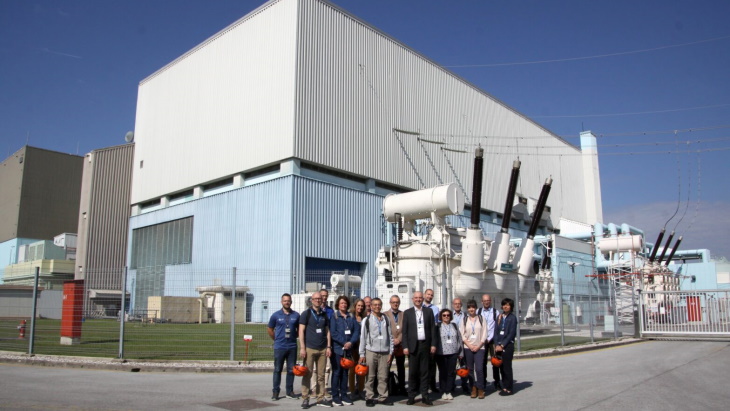IAEA sees Croatian commitment to radwaste management
Croatia is committed to addressing the challenges of managing its radioactive waste, an International Atomic Energy Agency (IAEA) team of experts has concluded. Croatia is a co-owner of the Krško nuclear power plant, located in neighbouring Slovenia.

The Artemis mission team (Image: Fund for Financing the Decommissioning of the Krško NPP)
The IAEA sent an Integrated Review Service for Radioactive Waste and Spent Fuel Management, Decommissioning and Remediation (Artemis) mission to Croatia at the request of the government.
Artemis missions provide independent expert opinion and advice, drawn from an international team of specialists convened by the IAEA. Reviews are based on IAEA safety standards and technical guidance, as well as international good practices.
A team - comprising five experts from Canada, France, Norway, Sweden and the UK, as well as three IAEA staff members - completed a nine-day mission on 19 June. An observer from the European Commission also attended the mission. The mission was hosted by the Croatian Fund for Financing the Decommissioning of the Krško Nuclear Power Plant.
The Artemis review evaluated Croatia's national framework, strategy and national programme for fulfilling the country's obligations for safe and sustainable management of used fuel and radioactive waste. The Artemis review gave special emphasis to the plans for the management of radioactive waste from the Krško plant and the plans for the establishment of a Radioactive Waste Management Centre at Čerkezovac in Croatia.
In its review, the Artemis review team considered the findings from previous IAEA Integrated Regulatory Review Service reviews in 2015 and 2019.
The 696 MWe Krško plant is a Westinghouse pressurised water reactor located on the Sava river. It is unusual in being jointly owned by two countries: Slovenia, where it is located, and Croatia, both of which were parts of the former Yugoslavia when Krško came online in 1981.
Used nuclear fuel from the Krško plant is initially stored at the plant. After storage, the fuel will be disposed of in a geological disposal facility which is planned to be developed at a location in Croatia or Slovenia. Low and intermediate-level waste from Krško is initially stored at the plant. There are plans to transfer half of this waste to Croatia, where it will be stored at the Radioactive Waste Management Centre at Čerkezovac. This facility will also receive radioactive waste, including disused sealed radioactive sources from medicine, industry, agriculture, research and education in Croatia. These are currently being kept at the locations where the sources were used.
Waste which will be stored at the planned Radioactive Waste Management Centre at Čerkezovac will later be disposed of at facilities which are to be developed in Croatia.
"Croatia has several of the necessary elements in place for a national programme for managing radioactive waste including stable financing arrangements," said Artemis team leader, Amélie de Hoyos, Safety of Radioactive Waste Disposal Engineer at France's Institute for Radiological Protection and Nuclear Safety. "Our review identifies areas for improvement, but notes that the Croatian counterpart is committed to addressing challenges associated with managing waste arising within the country, as well as managing the nation's share of operational and decommissioning waste from the Krško NPP. Croatia's efforts are currently focused on the predisposal management of the waste."
The Artemis review team identified recommendations and suggestions to improve the management of radioactive waste in Croatia, including: providing clarity and consistency on the roles of the relevant organisations, on planning assumptions and on programme milestones to facilitate communication and decision making; providing arrangements for the safe and secure centralised storage of institutional waste in Croatia; developing guidance stating regulatory expectations for safety assessments to support authorisation of radioactive waste storage and disposal facilities; and addressing the human resource needs of the regulatory body and the Fund.
"The suggestions and recommendations formulated by the Artemis review team and comprehensive discussions during the Artemis review meeting represent key elements which will definitely help us in further improving our waste management framework, planning and implementation," said Josip Lebegner, Director of the Fund.
The final report from the review will be provided to the government of Croatia in two months.
Researched and written by World Nuclear News
- China Institute of Atomic Energy
- Nuclear Power Institute of China
- Southwestern Institute of Physics
- China Nuclear Power Operation Technology Corporation, Ltd.
- China Nuclear Power Engineering Co., Ltd.
- China Institute for Radiation Protection
- Beijing Research Institute of Uranium Geology (BRIUG)
- China Institute of Nuclear Industry Strategy (CINIS)
- China Nuclear Mining Science and Technology Corporation


